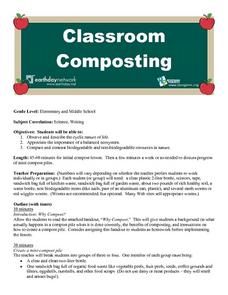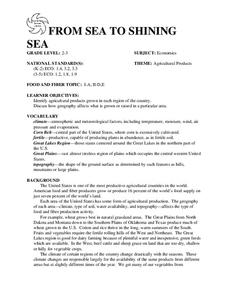Curated OER
Volcanoes:How Safe Are They?
Young scholars explore volcanoes, locate them on maps, record general information about volcanoes, and organize information on a fact sheet.
Michigan Sea Grant
Water Quality
Learners observe water samples and measure the samples' water quality. Students develop their own criteria for measuring water quality and test for temperature, acidity, oxygen levels, turbidity, conductance, sediment and hardness.
Curated OER
Classroom Composting
Learners discover the benefits of composting. They identify the steps of decomposition as well. They are read a book and discuss what items decompose.
Curated OER
Recycling by Composting
Middle schoolers examine the idea of recycling by composting. Using the internet, they research the benefits of composting to the environment. In groups, they collect numbers on how much food and yard waste is produced in their...
Curated OER
Yeast - A Dihybrid Cross
Young scholars make a yeast dihybrid cross and follow two forms of each of two traits: red growth versus cream color, and tryptophan-dependent versus tryptophan-independent.
Curated OER
Are Seeds in Danger?
Eighth graders discuss uses and disposal of common household chemicals. They select a household chemical to test for impact on plant germination. Students decide how they want to set up a seed germination project. They design their plan,...
Curated OER
Managing Nutrients in Livestock Manure
Livestock managers reinforce math and science skills while learning about the nutrients found in manure. They predict which animal produces the largest amount and which animal's manure contains the most nitrogen. Finally, they compare...
Curated OER
Water Pollution
Students explore the causes of water pollution. In this environmental lesson, students conduct experiments with natural filtration systems.
Curated OER
Living Corn Necklace
Fifth graders explore heredity and observable traits through experimentation. They view several different types of corn and record their observation of physical traits on a class chart. They create a corn necklace by sprouting dried...
Curated OER
Soil Composition
Learners investigate how soil composition affects plant growth. In small groups, they plant various seeds in different soil mixtures, record plant and seed growth, and analyze the results.
Curated OER
FROM SEA TO SHINING SEA
Identify agricultural products grown in each region of the country.
Discuss how geography affects what is grown or raised in a particular area.1. Hand out a copy of the two activity sheets "Food From Sea to Shining Sea" to each student....
Curated OER
What Are We?
Students describe different types of water pollutants. They complete experiments in which they observe the affects of water pollution on algae. They also brainstorm and list three causes of each water pollutant.
Curated OER
Clean Kansas Water
Students gain an understanding of ways we can be responsible custodians of our water supply. Students explore the governor's clean water initiative involving the Lower Kansas/Republican river basin and the pollutants present there.
Curated OER
Turn On A Light And Do Your Own Revegetation
Students use electricity and plant a seed to observe the process when coal is the major fuel source to produce electricity. They use the packet of native seeds to experiment with revegetation.
Curated OER
Finding Coal Products in Your Home
Young scholars identify items in their homes that come from coal. They divide into groups and decide as a group which items are made from coal by-products. They then divide their poster board into three columns and label the first -...
















